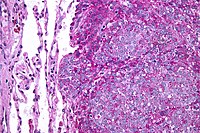
Photo from wikipedia
Metastatic recurrence remains a major cause of colorectal cancer (CRC) mortality. In this study, we investigated the mechanistic role of nuclear factor of activated T cells 1 (NFATc1) in CRC… Click to show full abstract
Metastatic recurrence remains a major cause of colorectal cancer (CRC) mortality. In this study, we investigated the mechanistic role of nuclear factor of activated T cells 1 (NFATc1) in CRC metastasis. First, we explored the potential role of NFATc1 in CRC using bioinformatics and hypothesized that NFATc1 might play different roles at different stages of CRC development. Then, we examined the relative expression of NFATc1 in 25 CRC tissues and adjacent normal tissues, and further analyzed the correlation between NFATc1 expression levels and clinical stages in 120 CRC patients. The role of NFATc1 in CRC metastasis and the molecular mechanisms were investigated in both in vitro and in vivo models. Our results showed that the expression of NFATc1 was increased in metastatic CRC tissues and positively associated with clinical stages (stage I vs. stage II, III or IV) of CRC. Overexpression of NFATc1 promoted CRC cell migration, invasion, and epithelial-mesenchymal transition (EMT). Moreover, SNAI1 was verified as the direct transcriptional target of NFATc1 and interacted with SLUG to promote EMT. Remarkably, our lung and liver metastasis mouse model demonstrated that NFATc1 overexpression accelerated CRC metastasis, and treatment with FK506, a calcineurin-NFAT pathway inhibitor, could suppress CRC metastasis in vivo. Taken together, our findings suggest that NFATc1 could transcriptionally activate SNAI1, which in turn interacts with SLUG to mediate EMT to promote CRC metastasis. Thus, making NFATc1 a promising therapeutic target in the treatment of metastatic CRC.
Journal Title: Experimental cell research
Year Published: 2021
Link to full text (if available)
Share on Social Media: Sign Up to like & get
recommendations!